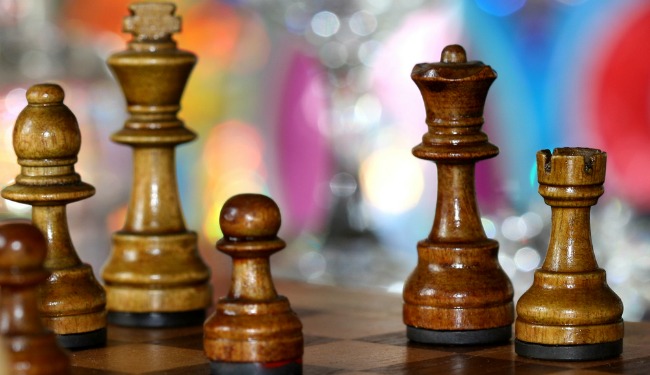Speed Chess Changed My Brain
Mastering the three-minute game saw improved skills in unexpected places, from poker to planking.

The poker table was down to three players. I had a queen and a 10. It wasn't the strongest hand, but I'd been analyzing my opponents' playing patterns and knew I needed to send an aggressive signal. As soon as I saw the leader start to move, I went all in and pushed my pile of chips to the center of the table. Both folded. "You didn't even give me a chance to finish my bet," he exclaimed.
By the end of the three-day MBA Poker championship held earlier this year at Planet Hollywood in Las Vegas, I left with $1,000 in winnings. Yet what was even more satisfying was how I placed: I came in fifth out of 135 players Friday and third out of 35 players that Sunday.
Those rankings aren't phenomenal, but they matter to me because of how much I improved. In the same tournament two years earlier, I had placed in the bottom half of players. Here's the mysterious part: I had barely even played poker over the last year, let alone worked at elevating my game.
What I had played was chess. Specially, I knocked out some 2,000 games of speed (or "blitz") chess in the two months leading up to the tournament. In fact, I played so much that I'm currently in the top half-percent of more than 1.3 million of blitz players at an online chess competition site. I've always thought of chess as my game, and I was ranked as a national master at age 16. I'd simply come to accept that I would always be an average poker player.
Chess has generated a lot of buzz lately as a learning tool to help children and young adults improve their decision-making ability, concentration, personal responsibility, and sportsmanship. As a supporter of a New York City charity that promotes chess in schools, I've been delighted to see the popularity of the game surge across the nation, especially as a slew of studies link chess with higher grades and better reading comprehension. Chess nights are being held at urban recreation centers. There's even a chess camp for girls to help them become interested in the game. And globally, the ages of the latest crops of chess grand masters are getting younger and younger.
I wondered if chess was the key to my improvement in poker. At first, I played blitz chess for fun. I had just finished a grueling consulting project and had a bit of rare free time, so I indulged in a few 3-minute games here and there. Unlike traditional tournament chess, which can take a couple hours per game, it was convenient to squeeze in a blitz match in between answering morning emails. Plus, the growth of online chess sites means there's a global community of skilled players available any time of the day or night. The problem, though, was that I got so absorbed in the game that I would play for hours. I was surprised at my level of concentration, and I experienced that incredible "flow" when you're so involved in a task that you lose all sense of time.
When I had played chess tournaments in high school, my coach had always warned me against spending too much time at speed chess. He worried that I would get so used to making snap decisions that I wouldn't develop the skill to patiently think through strategic moves. However, as an adult, I believe that the challenge of having to make some 40 moves in a three-minute game of speed chess actually trains your brain to think on a higher level. I'm convinced that the 80,000 fine decisions I made during the 2,000 games I played before the poker tournament enabled me to better recognize patterns of play and helped me win. During a game of speed chess on a plane, a flight attendant told me she had never seen anyone so focused before and didn't want to interrupt my game to offer me a drink.
The benefits of speed chess didn't stop there. The game had improved my concentration so much that endeavors in other areas of my life that had once seemed difficult were suddenly easier. I shaved a minute off my mileage pace while training for my first 5K and held the "plank" push-up position for two minutes straight. I stopped letting myself get distracted by email and sailed through tedious work assignments. Not only had my success at blitz chess given me a confidence boost, it helped me develop mental and emotional endurance.
I stopped thinking of my chess addiction as goofing off, but an important part of my brain fitness regimen that deserved as much dedication as my physical exercise routine. Each morning at 9 a.m., I scheduled an hour of blitz chess. On days when I had work deadlines, I made it a point to fit in at least a couple games at lunch. Some days I took a break, but I tried to build it into my daily routine just as I would brush my teeth. I also measured my performance and set weekly goals to improve my rating.
I feel fortunate to have discovered this brain-training tool as an adult and imagine how it could benefit younger players. I hope parents will encourage their children to learn and eventually love the game -- whether speed or traditional. My parents (whose parents emigrated from Armenia, where chess is a national passion) encouraged my brother to pick up the game who then taught me how to play when I was five years old. In fact, chess is a mandatory subject in Armenian schools from the age of six, and I think our schools should offer chess classes for all grades as an effective, inexpensive way to bolster students' self-esteem and academic performance. (There's a British pilot program underway to bring chess to primary schools.) Charitable donors should support non-profit organizations that promote chess in schools and as after-school programs. Finally, at the other end of the spectrum, older adults could take up the game as a way to stay mentally sharp. And maybe pick up some poker winnings in the process.



